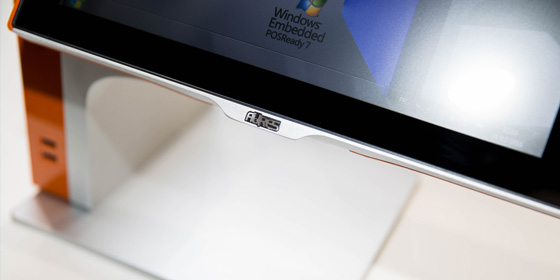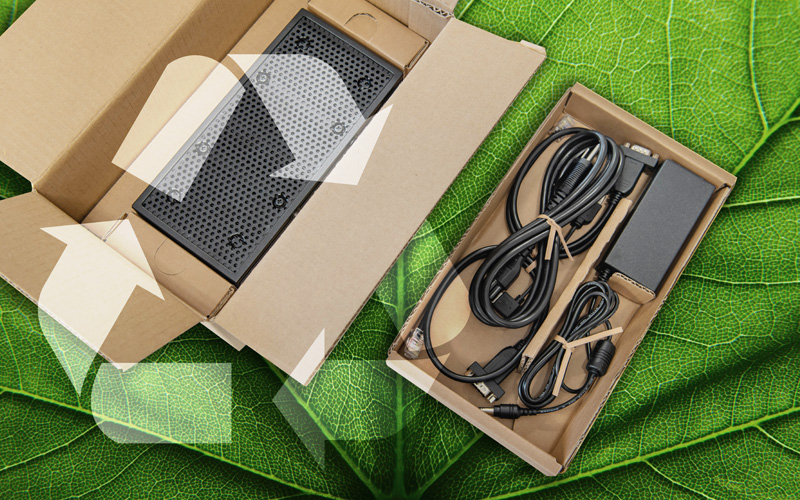Why develop eco-responsible AURES packaging?
By Mirko CONCA – Product Manager – AURES Group
Like most POS and KIOSK IT manufacturers, AURES Technologies has been working for years to improve the sustainability, eco-responsibility and recycling of its products and equipment ; developing greener technologies (Green IT) and reducing the Group’s carbon footprint are key issues.
What about the packaging and all boxes (and other contents) that protect our point-of-sale systems and our kiosks from the moment they leave the factory where they are produced, to the shop, sometimes at the other end of the world … where they are unpacked and deployed?
How can a POS/KIOSK Computer Manufacturer work intelligently and make progress on the eco-packaging issue?
If current trends continue, the packaging market is set to reach €1,000 billion between 2025 and 2030. The environmental footprint of the sector is considerable, and all players in retail and industry are concerned, with IT Manufacturers at the forefront.
Although necessary, packaging is a considerable source of waste, harmful to the environment and the oceans. In response to this growing awareness, all economic players are gradually turning away from traditional packaging in favour of more environmentally-friendly, biodegradable, compostable, recyclable, reusable or transformable packaging, for greater circularity.
What is AURES actually doing to move further towards more “Eco-Packaging”?
The notion of AURES POS and KIOSK hardware’s “sustainability” includes several inherent factors:
- The hardware itself (POS terminals, interactive and SCO kiosks…etc) has to be increasingly ‘green’, consuming less and less energy, and gradually becoming as recyclable and sustainable as possible.
- The plastic commonly used to manufacture point-of-sale terminals is often ABS, even though it is not very easy to use. Polyethylene, which is more recyclable, is unsuitable because it is not robust enough to last.
- The processors used in the new POS & KIOSK AURES systems are selected on the basis of TDF (Thermal Design Power), which indicates the level of dissipated energy – an important indicator of energy consumption and thermal dissipation.
- Logistics is an integral part of the challenge; reducing the carbon footprint generated by the transport of equipment, for example, will be optimised (preference will be given to boat over plane whenever possible, etc); similarly, we will be working to reduce the size and weight of packaging to lighten its CO2 footprint.
- Circularity is the new objective, and we will try to manufacture everything we can from recycled materials. Any part of a product that has reached the end of its life can be converted to make new products.
The new AURES packaging will therefore have an increasingly reduced carbon footprint over time:
- Elimination of over-packaging and inner protective cardboard boxes or elements
- Reducing the size, volume and weight of packaging
- Elimination of paints, coloured inks, typography, logos and other non-essential graphic elements on packaging (elimination of pollutants)
- Preference for unprinted cardboard (no dyes nor inks) and monochrome printing
- Preference for a single type of material (more easily recyclable)
- Elimination of all plastics from the cardboard interior: the protective and padding elements inside the packaging are replaced by elements made of moulded paper, folded cardboard and, where possible, FSC*-certified paper (Forest Stewardship Council®).
- Cables are now made available and held in cartons using cable ties made of paper rather than plastic; where possible, all the accessories and peripherals are packed within a single package, in order to limit their number.
- User manuals and other printed start-up guides for equipment, which are sometimes compulsory in some regions of the world, are now supplied exclusively on recycled paper.
In conclusion:
All recent AURES products (YUNO B, YUNO II, TRX 3000, NINO III, and soon EKO, JEOS II, etc) are packaged in a single box (no inner cardboard or outer cardboard), including their accessories.
All these new products come in brown packaging (natural cardboard) and feature minimalist, lightweight graphics (less ink, less glue, fewer pollutants, no paint);
All expanded polypropylene (EPP) and inner cardboard foam have been eliminated and replaced by moulded paper pulp or folded cardboard, which can be reused and recycled.




